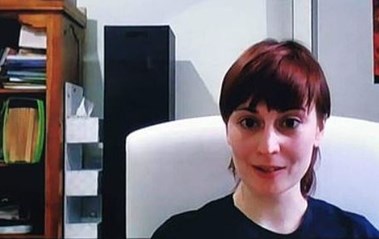Introduction: The Rise of Yvette Amos
In the digital age, it’s not unusual for ordinary people to become viral sensations overnight. Sometimes, it’s due to a heartwarming act, a funny clip, or even a perfectly timed moment captured on camera. Yvette Amos is one of those unforgettable internet figures — not because she set out to be famous, but because the world found humor and curiosity in a seemingly ordinary situation that spiraled into online fame. Her name became synonymous with one of the most iconic video call moments in recent memory, reminding everyone that even in our professional, digital-driven world, authenticity (and a bit of chaos) still has its charm.
Yvette Amos wasn’t a celebrity, influencer, or public figure when she appeared on television. She was simply a participant in a remote BBC Wales interview, offering her views on a particular topic. Yet, what happened in the background of her video call turned her into an instant meme, sparking thousands of jokes, debates, and think pieces across social media. What’s fascinating about her story isn’t just the viral moment itself, but what it revealed about internet culture, human nature, and the blurred line between public and private life in the era of webcams and home offices.
Her story encapsulates how one small detail — something as simple as what’s sitting on a bookshelf — can capture the attention of millions. Let’s take a closer look at who Yvette Amos is, what exactly happened that day, and why her brief moment of fame continues to be discussed even years later.
Who Is Yvette Amos?
Before the viral fame, Yvette Amos was an ordinary person living in Wales, with no particular intention of stepping into the spotlight. She was not an actor or an influencer, just a regular citizen sharing her opinion on a live television broadcast. She participated as a guest on BBC Wales’ show, which, like many broadcasts during the pandemic, was conducted remotely over a webcam.
Unlike seasoned media personalities who have professional studios, ring lights, and carefully curated backgrounds, Yvette’s setup was authentic — maybe too authentic for some viewers’ tastes. Behind her, on a bookshelf, sat a peculiar object that would soon make her infamous: what appeared to be a phallic-shaped ornament. The item, unintentional or not, became the focal point of online chatter almost instantly after the show aired.
To her, it might have been just another decoration in her home — but to the internet, it was comedy gold. Screenshots of the moment spread like wildfire across Twitter, Reddit, and Instagram. Suddenly, Yvette Amos went from an anonymous BBC guest to a household name known for one of the funniest Zoom backgrounds in history.
What’s intriguing about Yvette’s situation is that she didn’t actively seek attention. She wasn’t promoting a product, a brand, or herself. Yet her authenticity — and perhaps a little unawareness — resonated with millions. It reflected the universal reality that, in the age of remote work and video calls, we’ve all had our awkward moments on camera.
The Viral Moment: How It All Happened
The fateful appearance happened during a BBC Wales segment where Yvette Amos was speaking about unemployment and economic challenges. Viewers tuned in to hear insightful commentary — but what they got instead was an unforgettable backdrop that became the talk of the internet.
In the corner of her camera frame, on a neatly organized bookshelf, sat what viewers quickly identified as a rather risqué object. Social media users zoomed in, screenshotted, and shared the image with captions that ranged from clever to outrageous. The moment encapsulated the unpredictability of live TV in the Zoom era.
Within hours, Yvette’s name was trending. Memes flooded social platforms, with people jokingly suggesting that her background “deserved a BAFTA” or that she had “single-handedly improved lockdown television.” Others compared her to other viral stars of the pandemic, like the BBC dad whose kids interrupted his serious political interview.
What stood out, though, was the reaction from viewers — most found it hilarious but harmless. People appreciated that it wasn’t staged or fake. It was real life. In a world full of carefully curated online personas, Yvette Amos’s moment was refreshingly authentic. It captured what so many people had been experiencing during the pandemic — the blending of personal and professional spaces in the most unpredictable ways.
Internet Reactions: From Humor to Sympathy
The internet, known for its quick wit and even quicker judgments, responded to Yvette Amos’s moment with a mix of humor and empathy. Some people laughed uncontrollably, creating memes and GIFs of the now-infamous screenshot. Others empathized deeply, realizing how easily it could have been any of them in her place. After all, who hasn’t forgotten to double-check their background before hopping onto a video call?
One of the reasons the moment spread so fast is that it was relatable. During the COVID-19 lockdowns, millions of people were working and studying from home, turning kitchens, bedrooms, and living rooms into makeshift offices. Pets, children, and yes, embarrassing background items, often made unexpected appearances. Yvette’s moment was like a mirror for all those minor mishaps people experienced daily.
Even major media outlets joined in on the conversation. Publications like The Guardian and The Independent ran lighthearted pieces about the incident, using it as an example of the unfiltered human side of remote life. The jokes were plentiful, but so was the affection. People weren’t mocking Yvette maliciously — they were laughing with her, not at her.
Interestingly, her brief viral fame also sparked conversations about privacy, respect, and how quickly a private citizen’s life can be thrust into public view without consent. While the internet celebrated her, some commentators raised important ethical questions: should ordinary people become the subject of viral memes when they didn’t choose to? It’s a valid point that continues to shape discussions around internet culture today.
The Psychology of Viral Fame
The story of Yvette Amos isn’t just about humor — it’s a fascinating case study in the psychology of viral fame. One minute, you’re anonymous; the next, millions of people know your name. The rise of internet virality has turned ordinary moments into global sensations, and Yvette’s story is a perfect example of how that works.
Psychologists have long noted that people are drawn to authenticity. In a sea of filtered influencers and polished PR appearances, something as raw and unintentional as Yvette’s moment feels refreshing. It taps into a universal truth: people crave genuine, relatable experiences. The internet didn’t celebrate her because she was perfect; it celebrated her because she was real.
At the same time, viral fame can be overwhelming. Even if the attention is positive, it can feel intrusive. Suddenly, everyone has an opinion about you — your decor, your personality, even your personal life. For someone like Yvette, who wasn’t seeking the spotlight, that kind of attention can be jarring.
Yet, what’s remarkable about Yvette Amos’s case is how it remained largely good-natured. Unlike many viral moments that spiral into controversy or online harassment, hers became a symbol of humor and humanity during a difficult time in global history. People needed to laugh, and she gave them a reason to.
The Broader Cultural Impact
Yvette Amos’s viral moment might seem trivial on the surface, but it’s actually a perfect snapshot of pandemic-era culture. It highlights how technology reshaped communication, work, and even fame. Before 2020, it was rare to see someone’s home during a professional broadcast. But as remote communication became the norm, audiences became intimately familiar with the personal spaces of others.
Her story represents the merging of private and public life — an evolution accelerated by technology. Suddenly, our homes became stages, and our webcams became windows into our lives. That’s what made her appearance so striking: it blurred the boundary between what’s “on camera” and what’s “off-limits.”
Moreover, her viral fame revealed how humor served as a coping mechanism during difficult times. In 2021, when lockdowns were in full swing and people were yearning for lightheartedness, moments like Yvette’s provided collective relief. The laughter she sparked was more than just amusement — it was a shared human experience that reminded people to take life a little less seriously.
Culturally, Yvette Amos became part of the internet’s folklore — the kind of reference that pops up in “best viral moments” lists and nostalgic Twitter threads years later. She became a digital legend, a reminder that even the most ordinary situations can become extraordinary in the age of social media.
Lessons We Can Learn From Yvette Amos
It might sound odd to say there are “lessons” in a viral meme, but Yvette Amos’s story actually offers several meaningful takeaways. For one, it reminds us of the importance of authenticity. In a world obsessed with image control, her candidness was a breath of fresh air. People respected her more for being herself than for trying to appear perfect.
Another key lesson is about preparation and awareness. It’s a gentle reminder that when we step into a digital space — especially one that’s broadcast to the public — we should be mindful of our surroundings. It doesn’t mean we should hide our personalities, but a quick background check (literally) can prevent unintended fame.
Finally, her story teaches us compassion. The internet can be a harsh place, but Yvette’s case showed that it doesn’t have to be. People can find humor in something without cruelty. They can share laughter while still respecting the person behind the meme. That’s an encouraging sign for how online communities can evolve.
Yvette Amos and the Modern Meme Economy
Today, memes are a language of their own. They’re how people communicate, express humor, and connect across cultures. In that sense, Yvette Amos became part of a broader phenomenon — the meme economy, where viral moments have cultural value.
Her image circulated across thousands of memes, each remixing or reinterpreting her appearance in creative ways. Some were simply funny; others were clever social commentary. What’s interesting is how her image remained wholesome — unlike other viral figures whose stories took darker turns.
The meme culture surrounding Yvette’s moment also highlights how fast information spreads and evolves online. Within minutes of her appearance, users had created captions, hashtags, and reaction images that traveled around the world. It was digital storytelling at lightning speed — and she became its unlikely protagonist.
Even years later, references to her still pop up occasionally, often when people discuss the funniest or most iconic moments from lockdown-era television. She’s part of that collective digital memory that reminds people of a strange, often funny period in history.
Where Is Yvette Amos Now?
After her unexpected rise to fame, Yvette Amos largely stepped back from the public eye. Unlike some viral figures who capitalize on their fame, she didn’t pursue media opportunities or try to extend her moment. She returned to normal life, leaving behind a digital footprint that continues to resurface every now and then.
This choice actually makes her story even more endearing. In a world where viral fame is often monetized or exploited, she chose privacy and normalcy. She didn’t chase attention — she let the internet have its fun and quietly moved on.
Her name remains synonymous with authenticity, humor, and the unpredictable nature of online fame. Whether she realizes it or not, she left a lasting legacy in internet culture, proving that sometimes, you don’t need to try hard to be memorable — you just need to be yourself.
Conclusion: The Enduring Charm of Yvette Amos
Yvette Amos’s story is one of those rare internet moments that feels timeless. It’s not about scandal, controversy, or marketing. It’s about the beauty of imperfection, the humor of everyday life, and the shared laughter that connects people across screens. Her viral fame might have been accidental, but its impact was real — it gave the world something to smile about when it needed it most.





